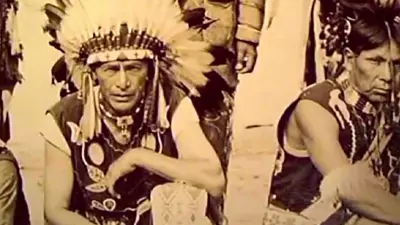CHICAGO — When Joseph Rupnick looks at the land around Shabbona Lake State Park in DeKalb County, Ill., he sees an area ripped away illegally from his people.

“One of the things that I see that I’m kind of sad about is that … when we occupied that land, it was covered with forest. A squirrel could start at the Mississippi [River], could go all the way to the Atlantic. The trees were that thick. You only see pockets now,” said Rupnick, chairman of the Prairie Band Potawatomi Nation, a federally recognized tribe of Neshnabé, with headquarters near Mayetta, Kan. “What we protected is gone, what we held sacred.”
Rupnick, who goes by “Zeke,” is leading a renewed movement to reclaim ancestral lands in DeKalb County that he says was “stolen” from his people in 1849 when Chief Shab-eh-nay went to Kansas to visit relatives who had been relocated from Illinois under the Indian Removal Act.
Chief Shab-eh-nay was a good friend of Shawnee leader Tecumseh, a close ally during the War of 1812, and, like his friend, was against killing civilians and prisoners of war. He was able to persuade angry warriors not to kill all the survivors of the Fort Dearborn massacre. After the war, Shab-eh-nay opposed attacks on settlements infringing on traditional lands.
In 1832, he went on a Paul Revere-like ride, warning settlers in DeKalb County of an impending attack and urging them to flee ahead of an attack by Sauk Chief Black Hawk.
For his actions, the federal government granted him 1,280 acres near what is now the Village of Shabbona. The land was awarded in perpetuity to the chief and his descendants, but when he headed to Kansas to visit family, the land was declared abandoned, seized by the government and auctioned off.
Legislation was introduced in the U.S. House in July by Reps. Chuy Garcia and Lauren Underwood, both Illinois Democrats, that would give the Potawatomi first refusal rights to property in the area for a reservation.
Sen. Jerry Moran, (R-Kan), introduced a companion bill.
“Twenty years ago, [House Speaker Dennis] Hastert [R-Ill.] filed a bill to invalidate our claim. That didn’t go anywhere,” Rupnick said.
“It’s way past due for the Potawatomi Nation to recover what is rightfully theirs,” Garcia, a member of the House Natural Resources Committee, said during an Aug. 11 news conference in DeKalb County. “The Prairie Band Potawatomi Nation deserves a home in DeKalb County.
Illinois is one of only 14 states that have no tribal reservations.
Neat little houses populate the tree-lined streets of Shabbona, home to 937 people, according to the 2020 census. The community, about an hour west of Chicago, encompasses just 1.36 square miles, or 870 acres, boasts a country club, ice cream shop, and rehabilitation center.
The tribe is eyeing 1,151 acres to add to the 129 acres it owns and is hoping to buy contiguous lots.
“We know we won’t be able to bring it back to what it was originally,” Rupnick said “We want to protect what is still there and make sure nothing else is lost or stolen. The lake in the park was man-made. Anything from my ancestors is gone — dwellings, graves — gone forever. I would hate to see anything like that happen again.”
If they have the funds, the tribe’s plan is to buy as much property as people are willing to sell.
State Sen. Cristina Pacione-Zayas, D-Chicago, whose district has a sizable number of Native Americans, said she supports the effort.
“I come from a background of colonized and displaced people,” said Pacione-Zayas, who is Puerto Rican. “Speaking of justice and reconciliation — it’s easy for me to get on board.”
In fact, the Illinois General Assembly is on board, but a resolution adopted in October acknowledging the tribe’s claim is only symbolic. Any action to establish a reservation must be taken at the federal level, and the Potawatomi needs Congressional action to make the dream a reality.
“I think what people are trying to do is reclaim their history, appropriately honor their ancestors, preserve their legacy and teach it,” Pacione-Zayas said.
“When we have an opportunity through government to restore that humanity and recognize it, you should take advantage of that. In many ways, the Native American tribes in our country have never met people outside their community with the violence and harm that was inflicted on their ancestors.”
Not everyone supports the effort. The DeKalb County Board, along partisan lines, voted against supporting the tribe’s effort, worried about the loss of property tax revenue the 1,280 acres represent.
It wasn’t immediately clear how much in property tax is at stake.
County Board Chairman John Frieders, who voted against supporting a reservation resolution, did not respond to inquiries for this story. Frieders has said the board wants to see a plan for the land and the precise language in any congressional resolution before making a decision on whether to support the idea.
“I don’t think this is in the best interest of the county,” Frieders said before the February vote. Later he said he struggles with the idea of righting wrongs committed in the distant past.
The Garcia-Underwood bill contains language providing $10 million for the tribe to purchase property. .
Suzanne Willis, vice chair of the County Board, supports the Potawatomi effort, describing it as a win for both the tribe and people living on the land.
Initially, the Potawatomi had planned to build a casino, and to give a cut of proceeds to the county, but the idea has gone by the wayside with plans for a state-licensed casino in nearby Rockford. Another idea floated is to build a Potawatomi cultural center and museum, but that would not be the same kind of revenue generator.
The county’s fiscal 2022 budget totaled $32.48 million. Losing 1,280 taxable acres would make a dent, however, given that a chunk of the county’s 406,000 acres is non-taxable, occupied by Northern Illinois University (756 acres) and Shabbona Lake State Park (1,550 acres), along with smaller county forest preserves. Much of the rest is farmland (370,000 acres), which is taxed on its agricultural value rather than the 33.3% rate imposed on other property.
Rupnick, who lives on the Prairie Band Potawatomi Indian Reservation in Jackson County, Kansas, said the Band has not decided whether they will move back to Illinois.
“It’s taken us so long to get to this point,” Rupnick said. “I don’t want to make any promises before securing the land. We’ll do whatever is in the best interests of the tribe and the community. We will make a decision after that.”







